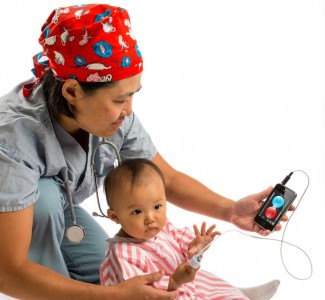UBC spin-off company Lionsgate Technologies Inc. is preparing to launch a software application — developed by two UBC professors — that transforms smartphones, tablets and laptops into mobile medical diagnostic tools capable of real-time vital signs monitoring.
Using standard medical sensors connected directly through the universal audio port of virtually any mobile device, the proprietary interface, called the Vital Signs DSP (Digital Signal Processor), provides precise monitoring of blood oxygen levels, blood pressure and body temperature which are displayed on the mobile device’s monitor.
The availability of an accurate, affordable mobile medical diagnostic tool has sweeping applications in the medical/clinical and consumer markets as well as in the developing world, where 64 per cent of mobile phone users are found.
“Pairing medical diagnostics with mobile phones will greatly advance the assessment, diagnosis and treatment of critical diseases in developing countries,” said Mark Ansermino, an Associate Professor in the Department of Anesthesiology, Pharmacology and Therapeutics and anesthesiologist at BC Children’s Hospital, whose team developed the technology. “The availability of portable, easy-to-use and affordable mobile health monitoring technology will move medical diagnostics from the hospital to non-hospital settings, helping reduce global health inequities and improving health outcomes worldwide.”
Dr. Ansermino worked with Guy Dumont, Professor of Electrical and Computer Engineering, and their team, Electrical & Computer Engineering in Medicine (ECEM), to develop Vital Signs DSP. The technology, which includes applications for pulse oximetry, temperature and blood pressure monitoring, requires no external signal processors, microcontrollers, power sources or displays. Users just download a proprietary app that allows their mobile device to drive a low-cost standard medical sensor.
Dr. Ansermino and Dr. Dumont received the prestigious Brockhouse Canada Prize for Interdisciplinary Research in Science and Engineering from the Natural Sciences & Engineering Research Council of Canada in 2010 for their work on various technologies that help anesthesiologists monitor patients and calibrate anesthesia to a patient’s level of consciousness. Both faculty members are scientists at the Child & Family Research Institute.
Lionsgate Technologies Inc. (LGTmedical) plans to launch its flagship product, the Phone Oximeter, into clinical markets in 2013, with blood pressure and temperature applications to follow. The Phone Oximeter will enable mobile devices to provide non-invasive measurements of blood oxygen levels. After downloading the app, a standard medical sensor attached to the patient’s finger is connected to the audio port of any phone, tablet or laptop. The sensor detects concentrations of oxygen in the blood and displays the readings in colorful symbols on the mobile device’s monitor making pulse oximetry easy to use and accessible.
This new technology platform supports ultra-low cost product design, which will make these applications affordable for everyone. LGTmedical’s mHealth devices are expected to cost between $10 and $40, which is significantly less than competing products on the market today.
The World Health Organization recognizes the importance of making pulse oximetry available and affordable to the developing world. The diagnosis and treatment of infectious diseases like pneumonia, which claims the lives of two million children under five years of age every year, can be greatly enhanced by affordable pulse oximetry. There are also large consumer market for mHealth vital signs applications in the areas of chronic disease management, personal care management, sleep apnea and fitness.
“Mobile vital signs technology will serve as a valuable tool in assisting with medical diagnosis, decision support, chronic disease management and patient engagement in the coming years,” said Tom Walker, President and CEO of LGTmedical. “We are proud of our innovations which mark a significant shift in the evolution of mHealth. From headphones to healthcare, making affordable health monitoring tools available to clinicians and consumers will help improve the quality of care, save lives and reduce healthcare costs.”
R&D and field testing of the Phone Oximeter has been conducted in both North America and emerging markets, such as Uganda, through the generous support of UBC, BC Children’s Hospital, the Bill and Melinda Gates Foundation, Grand Challenges Canada, and other sponsoring foundations and government agencies.
